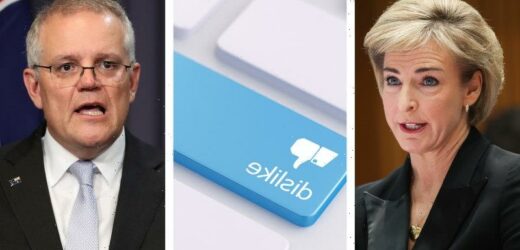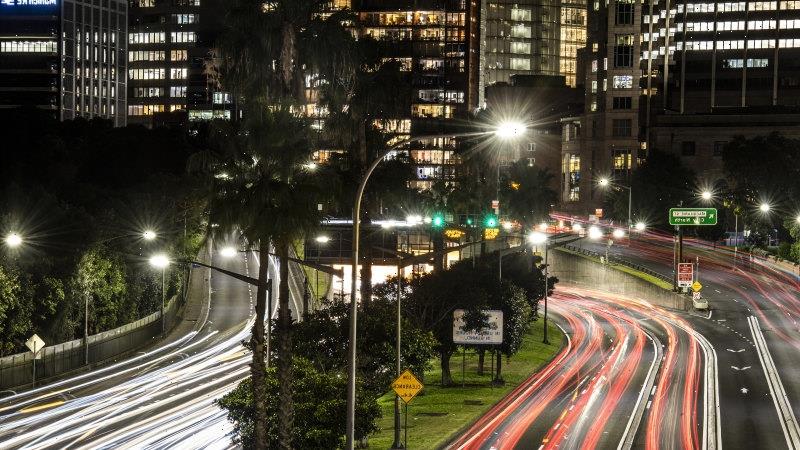Two-thirds of Australian adults back the idea of holding Facebook and other social media companies responsible for posts made on their platforms, while 70 per cent want anonymous “trolls” to be revealed in tougher rules for millions of users.
Voters support the case for greater oversight of the social networks, with 71 per cent favouring better regulation at the same time Prime Minister Scott Morrison promises a draft bill to subject the companies to tougher laws and court orders.
Scott Morrison and Michaelia Cash have announced a change to defamation laws to tackle anonymous trolls.Credit:Alex Ellinghausen, Getty Images
The exclusive survey, conducted for The Sydney Morning Herald and The Age by research company Resolve Strategic, shows 62 per cent of voters believe big tech companies help keep people connected but 16 per cent believe the sector can be trusted to regulate itself.
While almost half of all adults say tech services and products play a big part in their lives, 64 per cent said they were nervous about the collection and use of their personal data and 46 per cent thought the companies did not do enough to stop fake news or objectionable content.
The federal eSafety Commissioner, Julie Inman Grant, told a Senate hearing last month that a record number of Australians were disclosing online abuse, with 23,500 reports of illegal and harmful content last year across platforms such as Facebook, Twitter, Instagram and Snapchat.
Mr Morrison said on Sunday the government would release a draft law this week to give the Federal Court the power to order social media companies to identify the people behind anonymous accounts.
Labor leader Anthony Albanese backed the goal but said he wanted to see how the plan would avoid people shutting down accounts in Australia and opening new ones through internet providers overseas.
“People shouldn’t be able to hide behind anonymous Twitter accounts online and engage in inappropriate activity,” he said.
Greens senator Sarah Hanson-Young did not say whether the party backed the disclosure of anonymous accounts but called for a Senate inquiry.
However, Chris Cooper, executive director of Reset Australia, a not-for-profit backed by philanthropic organisations such as Luminate and the Minderoo Foundation, warned there was a place for accounts whose identity remained secret.
“Online anonymity does protect trolls from accountability, but it also is an important tenet of a free and open internet that protects critics of the powerful which can hold leaders accountable,” he said.
The Resolve Political Monitor surveyed 1606 people over six days to November 21, before the government outlined its plans, but after Mr Morrison had argued for stronger regulation over several years. The results had a margin of error of 2.5 per cent.
Asked if anonymous social media accounts should be made illegal, 40 per cent strongly agreed and 30 per cent agreed, producing a clear majority in favour. Another 20 per cent were undecided while 9 per cent disagreed.
Asked if social media companies should be held responsible for posts on their platforms, 34 per cent strongly agreed and 33 per cent agreed. Another 24 per cent were undecided and 10 per cent disagreed.
When the survey put the proposition that big tech did not pay enough tax in Australia, 67 per cent agreed while 3 per cent disagreed and another 30 per cent were unsure.
The greatest uncertainty among voters was about whether existing rules went far enough to make the sector pay for news content, a long-running dispute between social media companies and media outlets such as Nine Entertainment, publisher of The Sydney Morning Herald and The Age.
On this question, 47 per cent were unsure while 29 per cent thought the regulations went far enough, and 24 per cent said regulation did not go far enough.
One provision in the latest federal plan, to be released as an exposure draft this week, will require social media companies to set up a complaints system to remove defamatory remarks and identify anonymous users with their consent.
A second element will establish a Federal Court order to require social media giants to disclose those anonymous users without their consent, helping a defamation case to proceed.
A third part of the plan would change defamation law in response to the High Court decision in September that media outlets are legally responsible as “publishers” for comments by other people who responded to the media companies’ posts on Facebook.
The court ruling backed a claim by former Northern Territory youth detainee Dylan Voller against news outlets including the Herald and The Australian on the grounds they facilitated the comments from other people by posting on Facebook.
The government said it would ensure Australian people and organisations with a social media page were not legally considered to be publishers and could not be held liable for any defamatory comments posted on their page.
“Since the High Court’s decision in the Voller case, it is clear that ordinary Australians are at risk of being held legally responsible for defamatory material posted by anonymous online trolls,” Attorney-General Michaelia Cash said in a statement.
“This is not fair and it is not right. Australians expect to be held accountable for their own actions, but shouldn’t be made to pay for the actions of others that they cannot control.”
Meta Platforms, the owner of Facebook and Instagram, declined to comment as it needed more time to read the proposal. Twitter and Google, owner of YouTube, also declined to comment.
The federal announcement was welcomed by Australia’s two biggest media companies, News Corp Australia, publisher of The Australian, The Herald Sun and The Daily Telegraph, and Nine Entertainment Co, the owner of this masthead.
“These are tough new world-first laws that will give Australian courts the power to order social media giants to identify perpetrators or risk incurring hefty defamation payouts,” said News Corp Australia executive chairman Michael Miller.
James Chessell, Nine Entertainment Co’s managing director of publishing, said the move was an important step forward.
“For some time now, Nine, along with other media companies, has been campaigning for reform of defamation laws, to bring them into the 21st century,” Mr Chessell said.
The Morning Edition newsletter is our guide to the day’s most important and interesting stories, analysis and insights. Sign up here.
Most Viewed in Politics
From our partners
Source: Read Full Article



